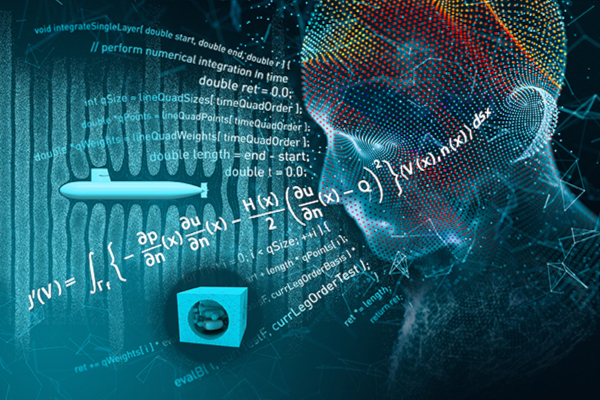Lectures:
- A brief introduction to the history of evolutionary algorithms and metaheuristics. Classification of metaheuristics based on their principle. Types of optimization problems (global, combinatorial, and multi-objective optimization). Objective function, constraints. Space of feasible solutions. Basic terminology.
- Local search algorithms: Hill climbing, tabu search, simulated annealing. Getting stuck in a local extreme and the methods of solution.
- Differential evolution: principle and its use in global optimization. Current variants of differential evolution and their application in real-world optimization tasks. Trends for improving the basic algorithms.
- Particle swarm and Self-Organizing Migration Algorithm (SOMA) and their current variants. Trends for improving basic algorithms.
- Combinatorial optimization: Knapsack, Traveling salesman problem, Vehicle routing problem. Solving selected problems using genetic algorithms.
- Combinatorial optimization and Ant colony optimization.
- Multi-objective optimization, Pareto set, Pareto frontier. NSGA II algorithm and its current variants.
- Optimization with constraints. Soft vs. hard constraints. Methods of the evaluation of the individual within the population. Nurse scheduling problem. Use of biologically inspired algorithms to solve selected problems.
- Evolutionary strategy: basic principle. Evolutionary strategy using covariance matrix (CMA-ES) in optimization with constraints.
- Dynamic optimization with constraints. Use of biologically inspired algorithms vs. other optimization methods.
- Optimization of problems with a high number of dimensions (large-scale optimization). The curse of dimensionality.
- Parallelization of biologically inspired algorithms.
- Comparing the algorithms from the perspective of their efficiency (statistical comparison of algorithms). No free lunch theorem.
Exercises (in PC classroom):
1. Global optimization, selected problems. Common basis for biologically inspired algorithms. Individual, popupation, generation. Ways of the algorithm termination.
2. Hill Climbing, Tabu Search, Simmulated annealing for the global optimization. The role of the normal and uniform distribution within the biologically inspired algorithms.
3. Differential evolution and its enhanced versions applied on the global optimization problems.
4. Particle Swarm Optimization algorithm and Self-organizing migrating algorithm (SOMA) and their application on the global optimization problems.
5. Gennetic algorithm and combinatorial optimization ( Knapsack, Traveling Salesman Problem, Vehicle Routing Problem).
6. Ant Colony Optimization and its application of the combinatorial optimization problems.
7. Multiobjective optimization, NSGA II.
8. Constrained optimization and biologically inspired algorithms. Nurse schedulling problem.
9. CMA-ES and the constrained optmization.
10. Dynamical optimization with constraints - application of the selected algorithms (differential evolution, SOMA) on the selected problems.
11. Large scale optimization and the role of the biologically inspired algorithms.
12. Parallelization of the biologically inspired algorithms.
13. Statistical comparison of the biologically inspired algorithms.
- A brief introduction to the history of evolutionary algorithms and metaheuristics. Classification of metaheuristics based on their principle. Types of optimization problems (global, combinatorial, and multi-objective optimization). Objective function, constraints. Space of feasible solutions. Basic terminology.
- Local search algorithms: Hill climbing, tabu search, simulated annealing. Getting stuck in a local extreme and the methods of solution.
- Differential evolution: principle and its use in global optimization. Current variants of differential evolution and their application in real-world optimization tasks. Trends for improving the basic algorithms.
- Particle swarm and Self-Organizing Migration Algorithm (SOMA) and their current variants. Trends for improving basic algorithms.
- Combinatorial optimization: Knapsack, Traveling salesman problem, Vehicle routing problem. Solving selected problems using genetic algorithms.
- Combinatorial optimization and Ant colony optimization.
- Multi-objective optimization, Pareto set, Pareto frontier. NSGA II algorithm and its current variants.
- Optimization with constraints. Soft vs. hard constraints. Methods of the evaluation of the individual within the population. Nurse scheduling problem. Use of biologically inspired algorithms to solve selected problems.
- Evolutionary strategy: basic principle. Evolutionary strategy using covariance matrix (CMA-ES) in optimization with constraints.
- Dynamic optimization with constraints. Use of biologically inspired algorithms vs. other optimization methods.
- Optimization of problems with a high number of dimensions (large-scale optimization). The curse of dimensionality.
- Parallelization of biologically inspired algorithms.
- Comparing the algorithms from the perspective of their efficiency (statistical comparison of algorithms). No free lunch theorem.
Exercises (in PC classroom):
1. Global optimization, selected problems. Common basis for biologically inspired algorithms. Individual, popupation, generation. Ways of the algorithm termination.
2. Hill Climbing, Tabu Search, Simmulated annealing for the global optimization. The role of the normal and uniform distribution within the biologically inspired algorithms.
3. Differential evolution and its enhanced versions applied on the global optimization problems.
4. Particle Swarm Optimization algorithm and Self-organizing migrating algorithm (SOMA) and their application on the global optimization problems.
5. Gennetic algorithm and combinatorial optimization ( Knapsack, Traveling Salesman Problem, Vehicle Routing Problem).
6. Ant Colony Optimization and its application of the combinatorial optimization problems.
7. Multiobjective optimization, NSGA II.
8. Constrained optimization and biologically inspired algorithms. Nurse schedulling problem.
9. CMA-ES and the constrained optmization.
10. Dynamical optimization with constraints - application of the selected algorithms (differential evolution, SOMA) on the selected problems.
11. Large scale optimization and the role of the biologically inspired algorithms.
12. Parallelization of the biologically inspired algorithms.
13. Statistical comparison of the biologically inspired algorithms.
